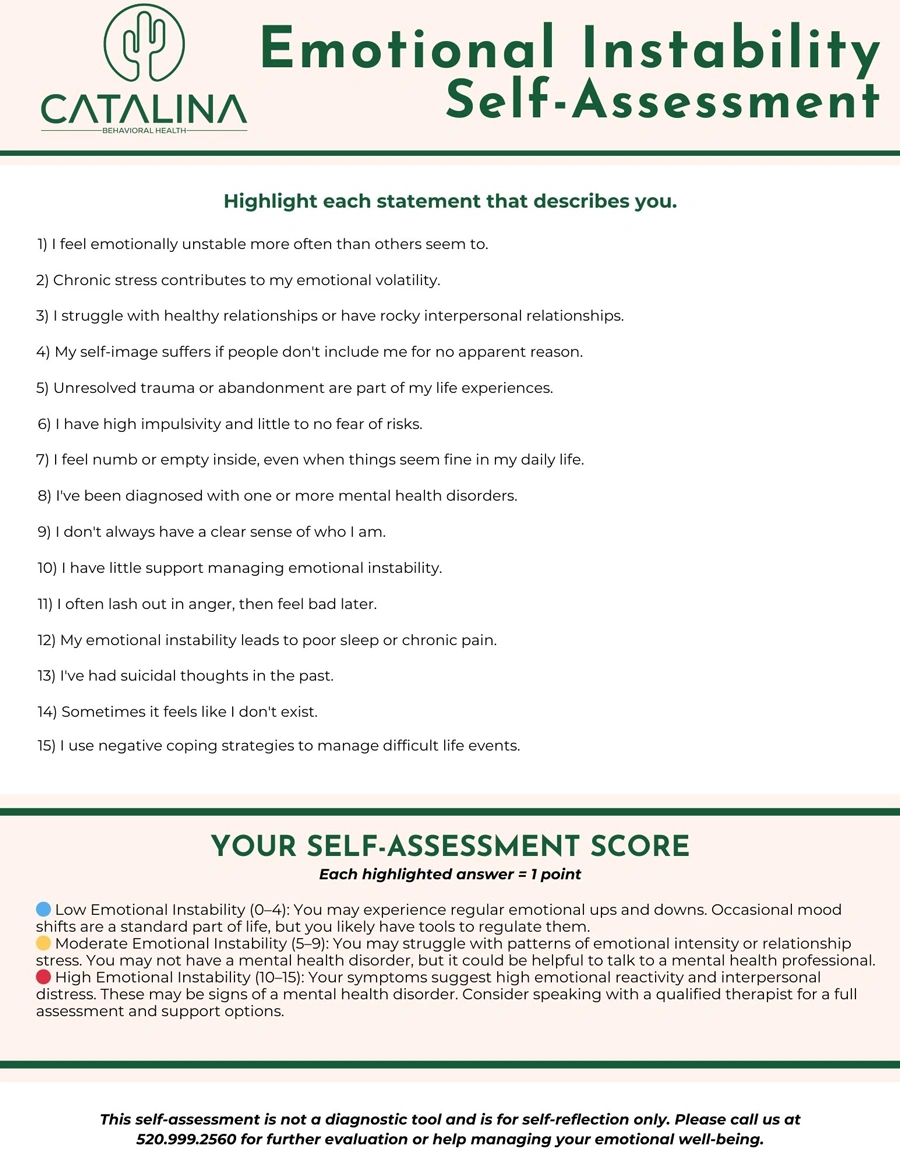An Informal Assessment to Learn More About Emotional Instability
Have you recently been asking yourself the question, “Why am I emotionally unstable?” Your severe mood swings and negative thought patterns may be the cause of a mental health disorder that transcends mere “moodiness.”
Indeed, there’s a significant difference between the day-to-day moods experienced in everyday life and feeling emotionally unstable. If you are unsure if you need to seek help, our free PDF quiz can help you decide.
Catalina Behavioral Health, Tucson’s leading mental health professionals, has helped many with managing emotional instability. With our help, our clients have overcome their mental health issues and restored emotional balance and physical health.
If you’re struggling with your own emotional instability, our online quiz can help you identify if it’s time to get professional help for those unpredictable mood swings.
Get Confidential Mental Health and PTSD Assessment
Quiz: Emotionally Unstable Personality Disorder (Borderline Personality Disorder)
As a general term, emotional instability refers to frequent, intense emotions and mood swings. The person may also have difficulty in controlling their stress levels and have troubled relationships.
Before you print off and take the quiz, let’s discuss what Emotionally Unstable Personality Disorder actually is. The term is used in the World Health Organization’s ICD 10/11 classification system for diseases. It’s essentially the same mental illness as Borderline Personality Disorder (BPD), except doctors in the United States use the Diagnostic and Statistical Manual (DSM-5), thus the different name.
Regardless of which diagnostic terms are used, emotional instability can significantly impact the overall quality of one’s daily life. If you want to assess if it’s time to get professional treatment for your unstable emotions, our self-assessment can help.
Our Self-Assessment is not a Diagnosis or Treatment Plan

Before taking our test, understand this is not an official diagnostic tool. Rather, it helps create self-awareness and helps you consider the reasons for the emotional instability.
After you take this quiz, seek professional help by calling Catalina Behavioral Health. We can help you take the next steps in restoring your emotional well-being.
Here are the points you’ll consider while taking your Emotionally Unstable Personality Disorder test:
1) I feel emotionally unstable more often than others seem to.
Feeling emotionally unstable – and recognizing that it sets you apart from your peers – could be a sign of borderline personality disorder. The emotional instability may impact your career and self-esteem, and make just getting through each day feel almost overwhelming.
2) Chronic stress contributes to my emotional volatility.
Those with emotionally unstable personality disorder often have high stress levels, which impacts the limbic system in the brain. This “rewiring” of the brain can make someone more likely to have marked mood fluctuations or become emotionally unstable.
3) I struggle with healthy relationships or have rocky interpersonal relationships.
People who live with a borderline personality disorder diagnosis often have unstable relationships. From co-workers to friends and loved ones, emotionally unstable people experience frequent conflicts because of their frequent mood swings and unpredictable behavior.
4) My self-image suffers if people don’t include me for no apparent reason.
Emotionally unstable personality disorder can come from a fear of rejection or abandonment, which is deeply ingrained in those who have experienced childhood trauma. These feelings can distort a person’s sense of self-worth so much that being left out, even unintentionally, can lead to intense anxiety or anger.
5) Unresolved trauma or abandonment are part of my life experiences.

The wounds of past trauma can stay fresh for some people, even degrading one’s emotional stability years later. Early wounds from childhood can lead to attachment issues and cause intense emotions all the way into adulthood without therapy.
6) I have high impulsivity and little to no fear of risks.
Reckless behaviors, including overspending, driving recklessly, or having unsafe sex, are common behaviors in some people with borderline personality disorder.
These actions often occur because the person hasn’t developed proper self-care and coping strategies, so they engage in these behaviors instead.
7) I feel numb or empty inside, even when things seem fine in my daily life.
Feeling empty or disconnected can be among the less obvious but still highly distressing emotionally unstable personality disorder symptoms. The inner void can cause one to become restless and dissatisfied. That can spiral into inappropriate soothing behaviors that make things even worse.
8) I’ve been diagnosed with one or more mental health disorders.
Borderline personality disorder doesn’t always occur on its own. Other mental health conditions, including PTSD, depression, bipolar disorder, anxiety, or substance use disorders frequently accompany it. Because of the overlapping symptoms, it’s necessary to get professional support from a mental health treatment specialist.
9) I don’t always have a clear sense of who I am.
The person who struggles with BPD may feel unclear about what they want their life is supposed to look like. They may change goals, values, or self-perception, sometimes feeling like a different person. This situation leads to increasingly unstable emotions and actions.
10) I have little support managing emotional instability.
Living without a healthy support system can make emotional instability and mental health increasingly worse. Without stable relationships, the mood swings and tumultuous emotions can spiral out of control. Those without a stable personal support system usually need professional therapy to learn to cope with the symptoms.
11) I often lash out in anger, then feel bad later.

Exploding in anger, followed by remorse, is a common symptom of emotionally unstable personality disorder. These feelings often come from stress or feeling unheard or misunderstood. The angry outbursts negatively affect relationships and careers.
12) My emotional instability leads to poor sleep or chronic pain.
Physical health can suffer from emotional instability. The emotional stress of poor mental health causes brain chemistry changes that cause disrupted sleep, headaches, muscle pain, or digestive issues. These factors can self-perpetuate, with emotional stability growing worse throughout the cycle.
13) I’ve had suicidal thoughts in the past.
Considering suicide or self-harm is the most dangerous sign of emotional instability. These thoughts are symptoms of deep emotional pain or mental health conditions. Professional assessment, therapy, and self-care for these symptoms are urgent.
Call *988 immediately if you are experiencing feelings of self-harm.
14) Sometimes it feels like I don’t exist.
The feeling that a person doesn’t exist is a mental health phenomenon called dissociation. This feeling is a response to severe emotional instability in borderline personality disorder. It usually happens as a response to stress or conflict and may cause you to struggle with brain fog or numbness.
15) I use negative coping strategies to manage difficult life events.
Some who struggle with emotional instability use drugs, abuse alcohol, isolate from others, or engage in self-harming activities like cutting.
Each of these may temporarily soothe the mood swings, but they make the unstable emotions harder to manage in the future.
What Are the Causes of Emotional Instability?

There is not a single factor or cause of emotional instability – that’s why seeking guidance from a treatment professional can make such a huge difference in feeling better.
Here are some of the better-known contributors to borderline personality disorder:
- Childhood abuse or past trauma
- Neglect or abandonment
- Chronic stress
- Unresolved emotions
- Hormonal imbalances
- Substance use disorder and withdrawal symptoms
- Mood disorders, including depression, anxiety, or bipolar disorder
- Neurological conditions impacting brain function
- Chronic sleep loss or fatigue
- Lack of emotional support from loved ones
- Attachment disorders
- Unstable living conditions
- Low self-esteem
The tricky part is that these can be either contributing factors to specific mental health conditions or symptoms that a problem may exist.
Catalina Behavioral Health provides professional therapy options to help you stabilize your mood and feel well again.
Get Accredited Treatment Programs at Catalina
Treatment Programs to Become Emotionally Stable
Having emotional instability or mood swings doesn’t mean that you can’t get help. We’ve successfully treated countless people, helping them experience healthy emotions after leaving our evidence-based programs.
Each person will receive a customized treatment plan, based on the factors that have contributed to their symptoms. Here are a few components most will likely experience during treatment:
Individual Therapy
Each person works with a professional therapist to explore the causes of their anger and emotions. These can be trauma, attachment issues, or negative thought patterns. After finding the cause, the person will likely receive Dialectical Behavior Therapy (DBT), the gold standard method for treating unstable emotions.
Medication Management
The on-site clinical team may prescribe anti-depression medication of moos stabilizers. They will ensure that each person receives effective doses and that the medicine doesn’t interact with other medications or lead to unwanted symptoms or side effects.
Group Therapy

Peer groups are a safe space for working on improving communication skills and building support systems. Discussing sensitive topics like one’s anxiety, mood swings, or impulsivity with others who can understand provides a great outlet.
Trauma-Informed Care
If the symptoms come from a history of traumatic events, Catalina will be sensitive to that in our approaches. We can help process those unpleasant memories and the past emotional wounds that lead to anxiety or rapid mood changes.
Dual Diagnosis Treatment
When the distressing emotions come from substance use, we integrate care. Treating both mental health conditions and all the symptoms simultaneously means we can achieve the best possible outcome.
Holistic Therapies
Clients in our programs learn to manage their anxiety, stress, and emotions using therapeutic techniques. These activities are based on what interests each person. They may practice mindfulness meditation, create art, do yoga, or engage in other activities that increase emotional stability and improve mood.
Up To 100% of Rehab Costs Covered By Insurance
Improving Emotional Stability and Mental Health Conditions at Catalina
Emotional instability is not a personal weakness; instead, the symptoms usually point to the presence of a mental health condition, which could be depression, bipolar disorder, PTSD, or anxiety, among others.
Our caring staff at Catalina Behavioral Health in Tucson are here to provide you with an assessment, accurate diagnosis, and comprehensive treatment plan to help manage your symptoms and experience emotions healthily again.
Call our admissions department today; we can help you learn about Joint Commission-accredited treatment programs and help you get started right away.







